A Voice for Change
A UH student helps recently incarcerated women reenter society.
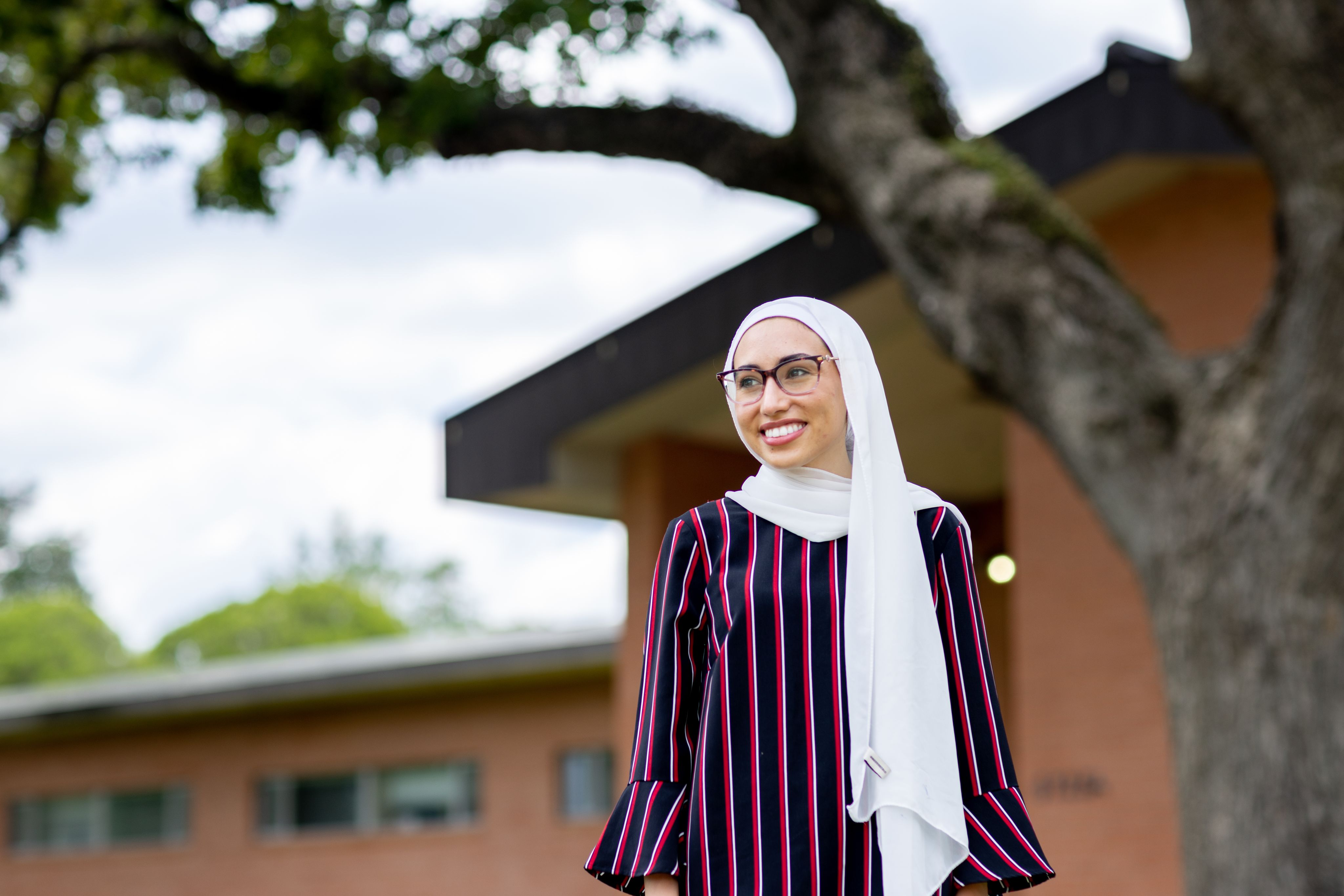
Patiently waiting is not the modus operandi of leaders looking to repair broken systems. Change doesn’t come by staying silent or hidden. It requires speaking up, acting and persisting. Just ask Sondos Moursy, a senior at the University of Houston’s Honors College
“Ask my mom. If she could describe me in one word, she would say ‘stubborn,’” Moursy says. “Once I want something, I will work for it persistently to the point of frustration.”
Moursy was taught to create change through action. Her parents taught the importance of giving back through regular family community service projects — experiences that have defined her path today. For Moursy, community service isn’t just a volunteer gig; it’s a vocation.
Moursy, a Phi Beta Kappa Public Service Scholar set to graduate this December with a degree in psychology and a minor in phronesis, intends to pursue a career in civil rights law to stand up for others, give a voice to those who have been silenced and combat the injustices of the criminal justice system.
Sharing Stories
In 2021, Moursy founded Stories in Health and Re-Entry (SHARE), a place for incarcerated women in disadvantaged communities to share their stories. To some, this subject may seem niche. That’s exactly why Moursy found it so problematic: No one was talking about it, much less asking questions — and this was no coincidence.
“Before working with these women, I had never actually extensively been involved with an incarcerated person. That’s very intentional by our system. They isolate these people so that we never come in contact with them, and we never witness their experience,” Moursy says.
“I wanted to collect the stories and experiences of these women in ways that the data was never going to tell."
She designed SHARE to provide a therapeutic outlet, resources and opportunities to support others. Community sessions are hosted at Angela House, a nonprofit facility in Houston that assists women transitioning back into society after incarceration. These sessions are a safe, intimate place for groups to express themselves and heal while finding support they would otherwise lack.
An Action Research in Communities fellowship, earmarked for the development of a new and unique program to serve the Houston community, helped Moursy kick-start the initiative. Her classes, professors and upcoming degree from UH equipped her with the skills needed to facilitate session conversations, which range from the women’s past experiences to their aspirations.
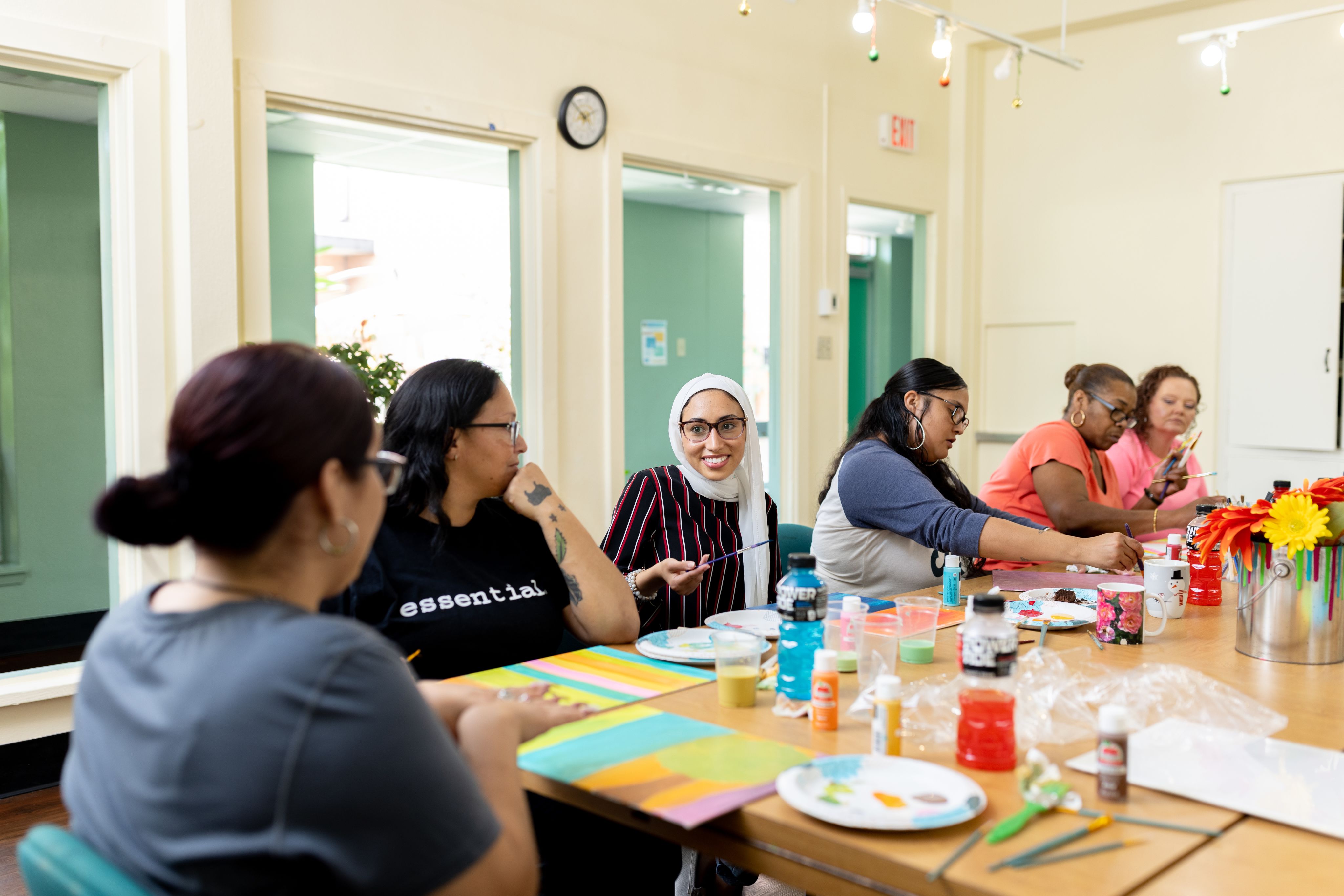
Sondos Moursy challenges Houston towork with its own communities to create thechange they want to see..
Sondos Moursy challenges Houston towork with its own communities to create thechange they want to see..
“I really enjoy the stories they tell about their childhoods, their goals, their dreams and experiences. Things they regret and look forward to,” Moursy says. “I feel really inspired and fulfilled talking to these women. I think that society looks down on them in a way that they should not when these women are some of the most resilient women I’ve met in my life, and I’m grateful to know them.”
SHARE isn’t the first time Moursy’s badge of stubbornness has paved the way for important change. When faced with the decision to dismiss her religious practices to blend in with the crowd, Moursy became the first and only NCAA track and field and cross-country athlete to wear a hijab while competing. She hopes persistence like this, along with her work with underrepresented communities in Houston, will spark opportunities and conversations that society tends to avoid.
Asking Questions
Moursy was first exposed to the challenges incarcerated women face as an intern in the Houston Mayor’s Office of Complete Communities, an initiative formed to bridge the gap between equity and opportunity in 10 of the city’s historically under resourced communities.
Moursy dug deeper into the factors that continue to plague disadvantaged communities: poverty, disparities in educational funding, discriminatory policies, the effects of slavery and redlining, among other issues. In reviewing statistics and trends around Houston women entering the prison system, she saw a glaring gap between the numbers and the stories.
“The data will tell you 10,000 women are incarcerated. They don’t tell you these women are mothers. They don’t tell you the impact on the children,” Moursy says. “They don’t tell you the factors that led to this woman being incarcerated — the lack of safety, the lack of support she continues to face, that her children face and their children face.”
“It’s important to work with communities to create the change they want to see.”
Moursy began asking questions and pointing out flaws in the systems that it seemed others simply accepted or ignored.
“I kept coming across these shocking statistics, like how the state was using second-grade test scores to decide or predict how many prison beds they would need in the future,” Moursy says. “That was so shocking to me because if we see these students from specific neighborhoods and specific economic statuses and races struggling, why aren’t we helping them? Why have we just come to terms with the fact that they will be incarcerated? That’s when I shifted all my research to focusing on mass incarceration reentry.”
Humanizing the data and giving women space to tell their stories are the primary functions of SHARE.
“I wanted to collect the stories and experiences of these women in ways that the data was never going to tell,” Moursy says. “To effectively approach amending injustices in our criminal justice system, we first need to see residents as humans and address their psychological needs.”
Creating Change
About 15 women attend the weekly SHARE sessions, though participants often change as women graduate from Angela House. Moursy facilitates the meetings, but advice, guidance and encouragement are shared between peers. Attainable goals and intentions are set each week. Many times, conversations evolve so that it’s less a formal meeting and more like friends hanging out. For many participants, the sessions are a source of stress relief and therapy and become the highlight of their week.
During sessions, the women use visual arts and do-it-yourself projects as forms of expression. Often, mothers make gifts for their children if they are unable to afford to purchase a gift, Moursy says. “It’s fulfilling to them [to create] a heartfelt gift to their children that they haven’t seen in years.”
For Moursy, who has been surrounded by strong women her whole life, the nurturing relationship between mothers and their children is the cornerstone of positive development and growth. In fact, Moursy inherited her penchant for enterprising from her own mother.
“I grew up watching my mom earn a Ph.D. while nursing a baby,” Moursy says. “The idea of what women were capable of was sky’s the limit. That was really important for me to see.”
Moursy has become a role model in her own right. Through SHARE, Moursy regularly sees how each person’s story, challenges and successes can effect change. Now, she’s calling on the community to take responsibility and work together to find solutions.
One of the first steps to making a lasting difference, she says, is to listen before creating a dialogue.
“It’s important to work with communities to create the change they want to see instead of forcing our own ideas of what they look like,” she says.
And if that change is going to happen anywhere, Moursy is confident it is going to happen in Houston. “Me, my team, my friends, my professors, people that grew up in the Third Ward — we all come together to really rally for certain causes. And that really fuels my fire because there are so many people who want to see change.”
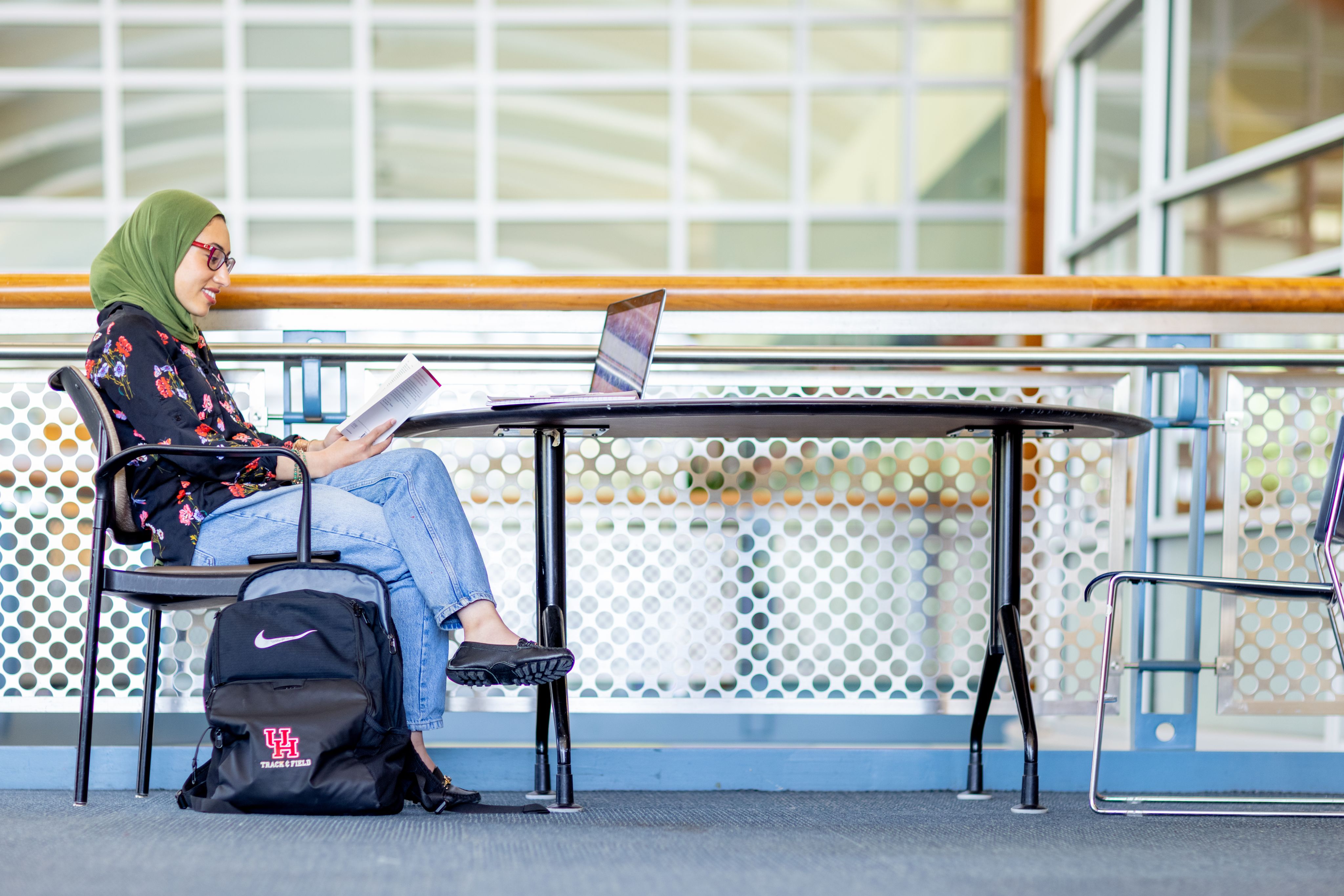
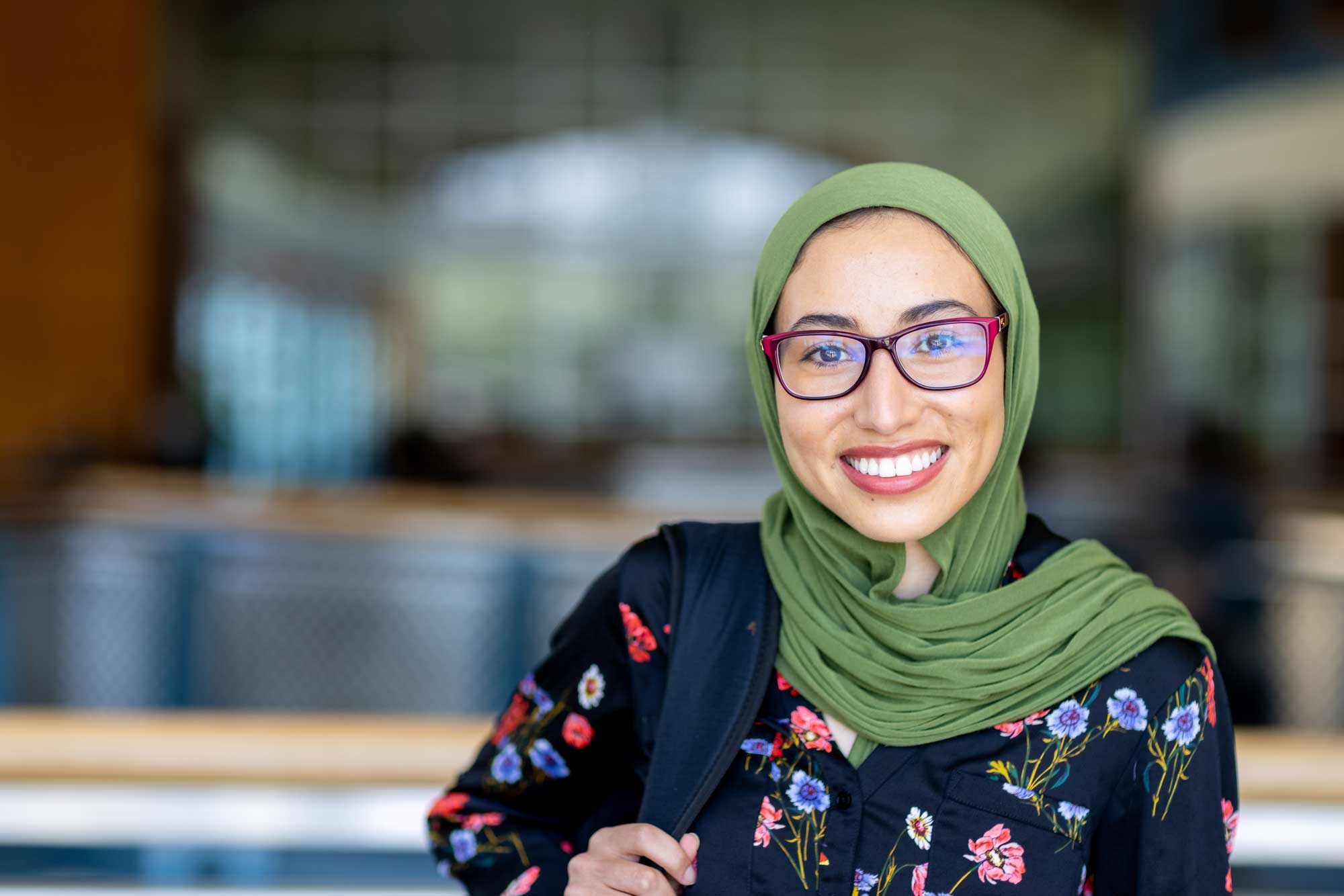
Sondos Moursy challenges Houston to work with its own communities to create the change they want to see.
Sondos Moursy challenges Houston to work with its own communities to create the change they want to see.
Asking Questions
Moursy was first exposed to the challenges incarcerated women face as an intern in the Houston Mayor’s Office of Complete Communities, an initiative formed to bridge the gap between equity and opportunity in 10 of the city’s historically underresourced communities.
Moursy dug deeper into the factors that continue to plague disadvantaged communities: poverty, disparities in educational funding, discriminatory policies, the effects of slavery and redlining, among other issues. In reviewing statistics and trends around Houston women entering the prison system, she saw a glaring gap between the numbers and the stories.
“The data will tell you 10,000 women are incarcerated. They don’t tell you these women are mothers. They don’t tell you the impact on the children,” Moursy says. “They don’t tell you the factors that led to this woman being incarcerated — the lack of safety, the lack of support she continues to face, that her children face and their children face.”
Moursy began asking questions and pointing out flaws in the systems that it seemed others simply accepted or ignored.
“I kept coming across these shocking statistics, like how the state was using second-grade test scores to decide or predict how many prison beds they would need in the future,” Moursy says. “That was so shocking to me because if we see these students from specific neighborhoods and specific economic statuses and races struggling, why aren’t we helping them? Why have we just come to terms with the fact that they will be incarcerated? That’s when I shifted all my research to focusing on mass incarceration reentry.”
Humanizing the data and giving women space to tell their stories are the primary functions of SHARE.
“I wanted to collect the stories and experiences of these women in ways that the data was never going to tell,” Moursy says. “To effectively approach amending injustices in our criminal justice system, we first need to see residents as humans and address their psychological needs.”
Creating Change
About 15 women attend the weekly SHARE sessions, though participants often change as women graduate from Angela House. Moursy facilitates the meetings, but advice, guidance and encouragement are shared between peers. Attainable goals and intentions are set each week. Many times, conversations evolve so that it’s less a formal meeting and more like friends hanging out. For many participants, the sessions are a source of stress relief and therapy and become the highlight of their week.
During sessions, the women use visual arts and do-it-yourself projects as forms of expression. Often, mothers make gifts for their children if they are unable to afford to purchase a gift, Moursy says. “It’s fulfilling to them [to create] a heartfelt gift to their children that they haven’t seen in years.”
For Moursy, who has been surrounded by strong women her whole life, the nurturing relationship between mothers and their children is the cornerstone of positive development and growth. In fact, Moursy inherited her penchant for enterprising from her own mother.
“I grew up watching my mom earn a Ph.D. while nursing a baby,” Moursy says. “The idea of what women were capable of was sky’s the limit. That was really important for me to see.”
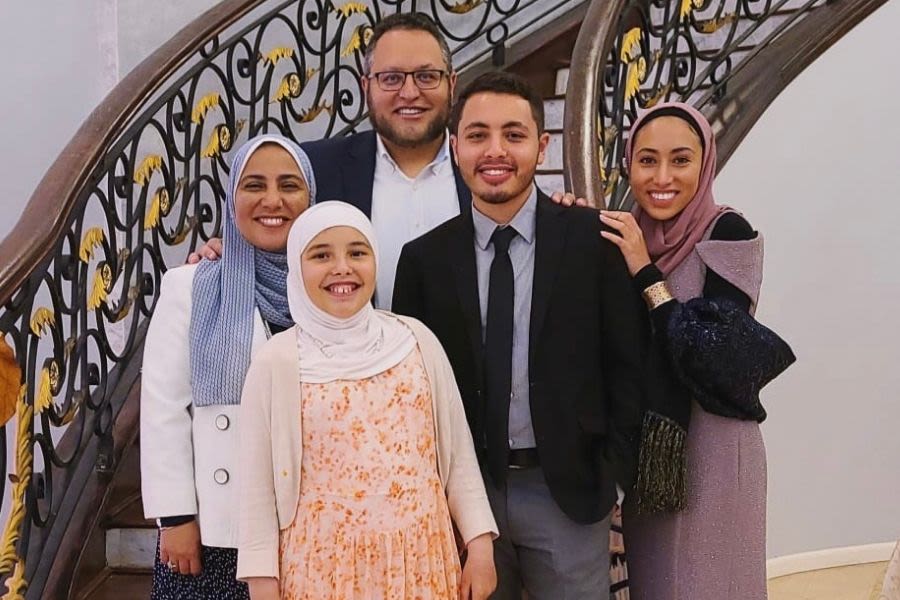
The Moursy family is involved in many community outreach efforts.
The Moursy family is involved in many community outreach efforts.
Moursy has become a role model in her own right. Through SHARE, Moursy regularly sees how each person’s story, challenges and successes can effect change. Now, she’s calling on the community to take responsibility and work together to find solutions.
One of the first steps to making a lasting difference, she says, is to listen before creating a dialogue.
“It’s important to work with communities to create the change they want to see instead of forcing our own ideas of what they look like,” she says.
And if that change is going to happen anywhere, Moursy is confident it is going to happen in Houston. “Me, my team, my friends, my professors, people that grew up in the Third Ward — we all come together to really rally for certain causes. And that really fuels my fire because there are so many people who want to see change.”

